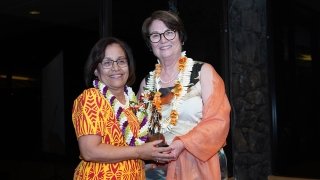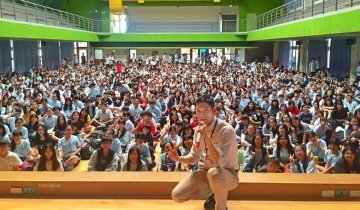USC Rossier continued the observance of its Centennial this year with an event in Hawaii that marked the school’s ties to the Aloha State.
In a celebration on Oahu, school leaders and alumni reflected on taking on leadership roles and on the legacies of educators.
“You are among the many USC Rossier graduates across the Pacific region who stand for the values of equity, diversity and opportunity that are at the core of our mission,” said Karen Symms Gallagher, Emery Stoops and Joyce King Stoops Dean of USC Rossier. “You make us proud.”
Following a series of teacher-preparation programs set up overseas by then-Dean Irving R. Melbo beginning in 1966, USC Rossier established an EdD program in Hawaii. The school flew faculty members from Los Angeles to Hickam Air Force Base—at the time, the only doctoral program in education in the state.
The program eventually moved to the Japan-America Institute of Management Science (JAIMS), expanding the program’s reach beyond a principally military-focused group of students.
USC Rossier incorporated its Hawaii-focused program into the school’s Educational Leadership program earlier this decade.
Leading a nation
Hilda Heine earned her EdD from the Hawaii program in 2004. In 2012, Heine was appointed minister of education for the Republic of the Marshall Islands, under President Christopher Loeak.
In 2015, Heine was elected president, the first woman to serve in the position.
In a speech at the Centennial celebration, Heine looked back on her political success, and on the fights for equity that remain.
“Aspiring Marshallese women politicians face many of the same impediments that women in other countries face when running for public office,” she said, noting the historical lack of representation by women and people of color in the United States Congress. “For Marshallese women politicians, the challenges are many, and the electorate is more finicky.”
“What I can say with certainty is that without having gone through the EdD leadership program, I don’t think I would be addressing this group as president of the Marshall Islands,” Heine said. “The program gave me a new degree of confidence and awareness that I did not have before. It gave me the courage to dare to open doors that I would have thought restricted to me as a woman; it allowed me to dream.”
On the brink
As president of the Marshall Islands, Heine has been faced with the legacy of the United States’ Nuclear Weapon Testing Program—the U.S. conducted atomic tests in the Marshall Islands throughout the mid-20th century—and the global threat from climate change.
The Castle Bravo bomb test in 1954 was, at the time, the most powerful atomic test ever recorded by the United States, registering a combined force 1,000 times more powerful than the atomic bomb dropped on Hiroshima in World War II.
“Since the testing, our people have continued to suffer, many of those who experienced the tests have passed on and no acceptable resolution has been found to correct this injustice,” Heine said. “Whenever we get the opportunity, we engage with our friends in the U.S. government to share ideas that could lead to an amicable resolution of this most unfortunate event in our history.”
As an atoll nation, the Marshall Islands are also under threat from rising sea levels, and Heine described the work her nation has done, and the partnerships it has formed, to help its people and culture survive.
“We cannot sit still and allow our fates to be in the hands of those who don’t understand, much less care, about the nightmare we face from the impacts of climate change,” she said.




